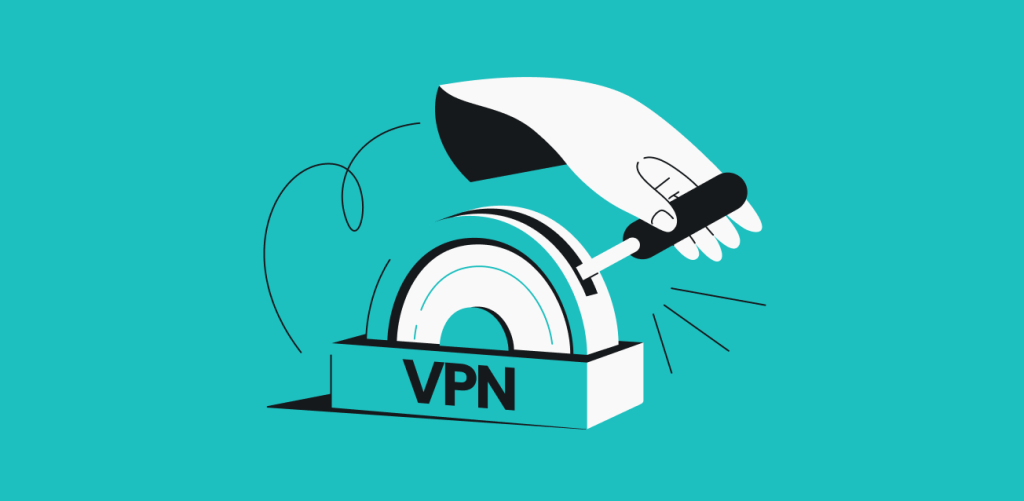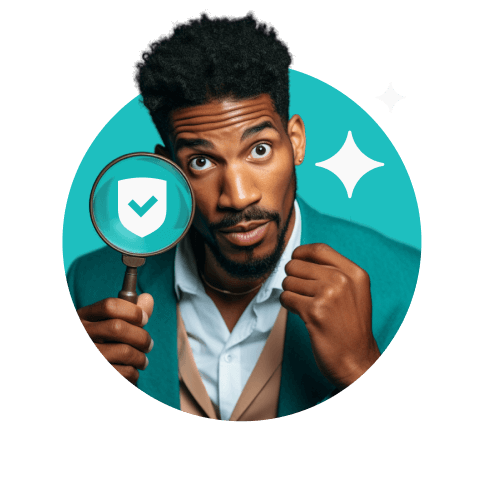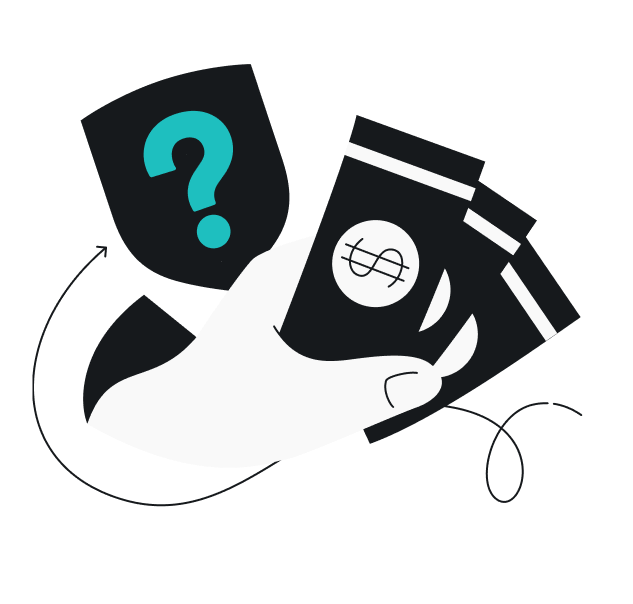
You should use a VPN (Virtual Private Network) whenever you’re online. By doing so, you make sure that your data and privacy are protected. Without a VPN, your every action online may be monitored and taken advantage of. A VPN encrypts all of your data, effectively hiding any information about you from prying eyes.
Table of contents
VPN essentials
Before we dive deeper into the reasons why you should use a VPN, let’s take a quick look at what a VPN does, the pros and cons of using a VPN, and how to choose the best VPN for your needs.
Main Question | Answer |
|---|---|
What is a VPN? | A VPN is an online security tool that protects your privacy and personal data. It does so by encrypting your data and hiding your IP (Internet Protocol) address from any intrusive third parties. |
When should you use your VPN? | You should use your VPN when you want to: |
Why disable your VPN? | Even though it’s generally recommended to keep your VPN connected at all times, there are some reasons why you may want to pause your VPN connection: |
Potential disadvantages of using a VPN: | Improvements to your online privacy and security do come at a slight cost. Here are some disadvantages you may face when using a VPN: |
What to look for in a VPN? | Most of the disadvantages mentioned above are either significantly reduced or entirely mitigated by leading VPN providers. Here’s what you should look for in a VPN to get the best possible experience: |
Why keep your VPN on at all times? 12 reasons for using virtual private networks
You should always have your VPN on because it hides your IP address and encrypts your traffic, keeping you safe and private online. You need a VPN because it helps protect your information from data leaks, snoops, and cyberthreats (especially when connecting to public Wi-Fi networks) while providing more freedom on the internet.
Let’s dive deeper into the irrefutable arguments for keeping your VPN running 24/7.
-
Connect to public Wi-Fi securely
Using public Wi-Fi networks can be very risky. Hackers can connect to the same network and easily access your data and personal information. This risk increases even further if it’s an open network without a password.
To prevent others from accessing your email, photos, login information, or credit card details, use a VPN to protect yourself on public Wi-Fi and encrypt all your internet traffic.
-
Avoid ISP throttling and boost your internet speed
Some internet service providers (ISPs) limit your internet speed when you take up high-bandwidth activities, such as streaming videos, video calling, or downloading files. Fortunately, your ISP cannot see what you do online when connected to a VPN. As a result, they are far less likely to throttle your connection speed.
-
Protect your personal data
ISP throttling might sound bad, but as of 2017, ISPs in the US can legally collect and sell your data to third parties. Not to mention, there are hackers and other bad actors that constantly try to snoop on your web traffic. A VPN protects you from prying eyes by encrypting your traffic before it leaves your device.
-
Overcome targeted ads
Unprotected traffic is easy to track. Third parties collect data that is easily accessible and sell it to advertisers. Any traffic encrypted by a VPN is useless to advertisers, which means you don’t get targeted.
For example, Surfshark offers the CleanWeb feature with a built-in ad blocker. It’s included in all our VPN plans, and you can use it as soon as you download our VPN app. It adds an extra layer of security to your internet connection, giving you yet another good reason to always use a VPN.
-
Beat local firewalls by connecting to a remote server
Your school, dorm, or workplace may have their own ideas about what you should be able to access online. But with a VPN, you can trump their censorship measures with ease. In fact, you won’t have to do anything extra — just have a VPN on.
-
Stay safe even without the S in the HTTP
HTTPS stands for HyperText Transfer Protocol Secure, and it keeps you safe by encoding your data when visiting a site. Some websites don’t use the secure HTTPS extension. Even for those that do, HTTPS uses TLS (Transport Layer Security) encryption, which is far easier to crack than a standard VPN encryption.
So don’t gamble with your safety and privacy — keep that VPN running.
-
Overcome censorship
The internet isn’t as free as we would like it to be. Some governments around the world use censorship to block your access to news, entertainment, and even social media apps.
Having an active VPN helps you bypass oppressive censorship and hide the digital traces of doing so.
-
Surf the web privately
Privacy is one of the main reasons for using a VPN. Unprotected connections are easy to pick on, which means your data and sensitive information may be vulnerable whenever you go online without additional protection.
A VPN encrypts all traffic before it leaves your device. So whenever there’s an attempt to snoop on you, your data is unintelligible; therefore, no one can benefit from it. If you are still wondering if your VPN should be on or off, think about whether you’d rather surf privately or risk being followed.
-
Save money when shopping online
The prices you see when shopping online can differ drastically depending on your location. You are also likely to see an increase in price if you show continued interest in a certain product or service. This is most obvious with flight tickets and accommodation.
You can save money with a VPN whenever you’re shopping online. A VPN connection allows you to change your virtual location and hides your activity. As a result, you often get better deals when your VPN is on.
Disclaimer: Please note that using Surfshark services for any illegal activities is strictly forbidden and violates our Terms of Service. Make sure that any use of Surfshark services for your particular activities conforms to all relevant laws and regulations, including those of any service providers and websites you access using Surfshark.
-
Protect all your devices
With Surfshark, you don’t need to count your VPN connections because it does not limit the number of devices you can connect simultaneously. Any device that connects to the internet benefits from a VPN connection, so make sure that you install the Surfshark app on all of your devices to keep your online privacy safe at all times.
-
Protection from phishing attacks
Bad actors rely on user data to launch deliberate phishing attacks, also known as spear phishing. The more data they can access, the more accurate and dangerous these attacks become.
A VPN service may not put an end to emails from Nigerian princes looking to share their inheritance, but it can protect you from elaborate attacks that use your personal information.
You can also reduce phishing emails by using Alternative ID. It’s a tool that allows you to create multiple alternative email addresses. You can use them to create accounts, fill in forms, or anything else that may attract spam and phishing attacks. Doing so will ensure that all unwanted emails go to the alternative emails instead of your main account.
-
Stay safe from DDoS attacks
DDoS (Distributed Denial of Service) attacks target you by your IP address. Since a VPN changes your actual IP to that of the VPN server, hackers and sore losers can’t use your IP to target you. That’s a particularly useful feature for gamers and streamers, as they’re the most common targets of DDoS attack

When you may need to turn off your VPN
A VPN’s primary job is to keep you safe and private online. However, you might run into situations where it’s best to turn your VPN off. Here are some examples:
Situation | What makes using a VPN a good idea | When you should consider turning it off |
|---|---|---|
Connecting to public Wi-Fi | Protection against hackers and data interception | — |
Browsing at home | Prevention of ISP tracking and increases privacy | If you completely trust your network and don’t need privacy |
Streaming | Access to home content abroad | Some platforms block VPNs, requiring frequent server changes |
Online banking | Secured sensitive financial data on public networks | Some banks block VPN access for security reasons |
P2P sharing | Hidden IP address | Might slow you down |
Avoiding government censorship | Access to blocked sites in countries with limited internet freedom | Some countries ban VPNs |
Gaming | Protection against DDoS attacks and reduces ping in some cases | May increase latency or get you banned in certain games if VPN use violates their terms of service |
Shopping for better deals | Defense against price discrimination by changing location (flights, hotels, subscriptions) | Some sites block VPN-based purchases, leading to transaction issues |
Remote work & business use | Encryption of company data and secure connections | Some corporate networks require custom solutions instead |
Using VoIP services | Unblocked VoIP apps (e.g., WhatsApp, Skype) in restricted countries | May cause lag or call quality issues due to encryption |
Downloading software & files | Secure downloads and protection against activity-based ISP throttling | Might slow you down |
Smart device security | Securing all home devices with a VPN on a router | Some smart devices don’t support VPNs natively |
Emergency services & GPS | Location masking for privacy reasons | In case of a real emergency, it may interfere with location tracking |
- Banking: some banks may prohibit signing in from a foreign IP. As a result, you would have to switch the VPN off or use a split-tunneling feature;
- At home: if your internet seems to be lagging and you need to get on that very important conference call, turning off your VPN for a while might be a good idea;
- Certain websites: some websites may not let you enter while having a VPN on;
- PayPal: according to their User Agreement, any use of a proxy or other anonymizing service is not allowed. This way, they try to mitigate online fraud like money laundering.
How to keep a VPN on all the time
It’s easier than you’d expect. Here’s how to use a VPN at all times:
- After installing a VPN, open the app and select a server to connect to. If you have a hard time choosing a server, you can simply click the Fastest location button on your Surfshark app;
- Once connected, a VPN will stay on until you turn it off manually.
If you want the VPN to automatically connect whenever you reboot your computer, simply toggle the Auto-connect option in Surfshark’s VPN settings menu.
Why cybersecurity should be your top priority
From losing your login info to getting your identity or money stolen, cyberattacks prove to be a rising threat to everyone.
According to the Federal Bureau of Investigation’s Internet Crime Reports, in the US, the number of cybercrime victims in 2024 was close to a million (859,532).
With these concerning statistics in mind, you should treat your privacy as the top priority. A barrier like a VPN works like your home’s front door — only when it’s closed will it keep strangers out and all your belongings safe.
Final takeaway — to keep or not to keep my VPN on at all times?
Yes, you should keep your VPN on whenever you’re online. It keeps your sensitive information away from prying eyes and ensures a private, secure connection to the internet. On top of that, setting up and using a VPN is super simple, making it easy for you to protect yourself online.
FAQ
Should I use a VPN at home?
Yes, you should use a VPN when you’re at home, especially when you’re working with sensitive data. If you feel like your privacy is breached with intrusive ads or you have reasons to believe your internet service provider is spying on you — then you have even more of a reason to use a VPN.
Why shouldn’t I use a VPN?
There are times when you may want to consider turning your VPN off or using a split-tunneling feature to exclude certain apps or websites from VPN activity. That’s because:
- A VPN might reduce your connection speed even if your internet service provider isn’t throttling your speed;
- Using a VPN on mobile will increase your mobile data usage;
- Some apps may require your IP to come from your country of residence. This is particularly common with banking apps. You may want to access them from a local server or without a VPN.
Should I leave my VPN on all the time on my phone?
Yes, if you’re looking for maximum security and privacy. However, if you’re using a limited data plan, bear in mind that keeping a VPN running will increase your mobile data usage.
Is a VPN actually necessary?
Yes, a VPN is necessary. Think of it as health insurance. You hope you’ll never need it, but you know that it’s best to have it just in case. You may never break your leg or have a hacker target you, but if you do, you’ll want that safety net.
When should you use a VPN?
You should use a VPN whenever you’re online. Cybersecurity threats are everywhere, and you can effortlessly protect your privacy and sensitive information by connecting to a VPN.
Should I get a free VPN?
No, you shouldn’t get a free VPN. Data protection is one of the main selling points of any good, secure VPN provider. Unfortunately, free VPNs can’t afford industry-leading security features, as proven by 25+ million leaked user records in 2022 alone. On top of that, some free VPN services are even known to sell user data to third parties. So, free VPNs defeat the main purpose of using a VPN in the first place.
Why should I use a VPN on my phone?
You should use a VPN on your phone because your personal data is just as vulnerable on a mobile device as it is on your computer. Many users are starting to ditch their computers and use their phones as the primary device for everything on the internet, so it’s best to make sure your activity is protected.
Why should I use a VPN for streaming?
Streaming video content uses up a lot of bandwidth, and your ISP may not like that and decide to throttle your connection. When you use a VPN, your ISP can’t see what you’re doing, which prevents your ISP from throttling your connection and allows you to enjoy buffer-free streaming.
Why should I use a VPN for gaming?
Using a VPN for gaming can protect you from DDoS attacks and ISP throttling. This ensures a smoother gaming experience without sudden drops in internet speed or attacks from sore losers trying to ruin your connection.



